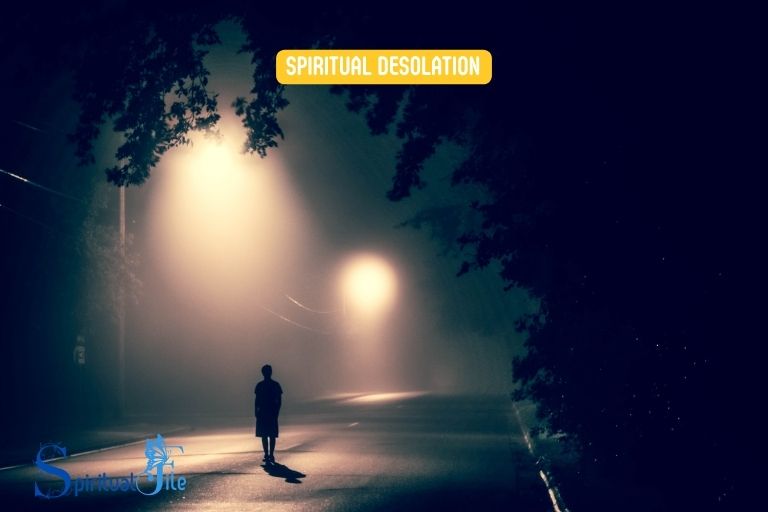Example of Spiritual Desolation: Loneliness!
Spiritual desolation is a state where one feels a sense of loneliness, emptiness, or abandonment by God. It often involves feelings of unease, sadness, or lack of motivation in pursuing spiritual activities or commitments.

Key Takeaway
5 Interpretations: Example of Spiritual Desolation
| Interpretation | Description |
|---|---|
| Emotional Emptiness | In spiritual desolation, individuals may experience a profound sense of emotional emptiness, a feeling of spiritual void or disconnect from their beliefs and source of inner strength. |
| Loss of Faith | It often involves a loss of faith, where individuals may struggle with doubts, skepticism, or a crisis of belief, leading to feelings of spiritual desolation. |
| Isolation and Loneliness | Spiritual desolation can lead to isolation and loneliness, a sense of being spiritually adrift and cut off from meaningful connections. |
| Struggles with Purpose | It may result in struggles with purpose and meaning, as individuals grapple with existential questions and seek to rediscover their spiritual direction. |
| Seeking Resolution | Those in spiritual desolation often seek resolution through self-reflection, prayer, counseling, or other means to restore their sense of spiritual well-being. |
How To Identify Spiritual Desolation?
Identifying spiritual desolation can be challenging, but recognizing signs such as a lack of peace, emptiness, and a feeling of being distant from god can help.
- It’s essential to be aware of these examples of spiritual desolation to address them and seek the necessary spiritual guidance for healing and growth.
- Spiritual desolation refers to a state of inner emptiness, disconnection, and emotional turmoil that can affect individuals on their spiritual journeys.
- It is characterized by a lack of spiritual consolation and a sense of distance from god or higher powers.
- Understanding and identifying spiritual desolation is crucial for individuals seeking to navigate their spiritual paths effectively.
In this section, we will explore signs to look out for in order to recognize and address spiritual desolation. Let’s delve into the emotional symptoms and behavioral indicators that can help identify this state.
Signs To Look Out For
Emotional Symptoms
- Feelings of sadness, emptiness, or hopelessness: Individuals experiencing spiritual desolation may find themselves overwhelmed by a sense of deep sadness or despair.
- Lack of motivation or interest in spiritual practices: A noticeable decrease in enthusiasm for activities such as prayer, meditation, or attending religious services can indicate spiritual desolation.
- Persistent feelings of doubt or confusion: A continual questioning of one’s faith, beliefs, or purpose can be a sign of spiritual desolation.
- Increased vulnerability to negative emotions: Spiritual desolation may make individuals more susceptible to feelings of anger, resentment, or self-criticism.
Behavioral Indicators
- Withdrawal from spiritual communities or relationships: Those experiencing spiritual desolation may isolate themselves from others who share their beliefs, distancing themselves from support systems.
- Neglecting self-care and spiritual practices: Individuals in spiritual desolation may disregard their usual rituals or routines that contribute to their well-being.
- Engaging in self-destructive behaviors: Some individuals may resort to harmful habits such as excessive drinking, substance abuse, or reckless behavior as a means to cope with spiritual desolation.
- Difficulty making decisions: Spiritual desolation can lead to indecisiveness, making it challenging for individuals to determine the best course of action in their spiritual lives.
By staying mindful of our emotions and behaviors, we can actively seek the support and guidance needed to move towards spiritual consolation.
Remember, everyone’s spiritual journey is unique, and seeking assistance from trusted spiritual advisors, therapists, or supportive communities can make a significant impact on overcoming spiritual desolation.
Causes Of Spiritual Desolation
Spiritual desolation can have various causes, such as a lack of connection with a higher power, unresolved inner conflicts, negative influences, or a loss of faith.
An example of spiritual desolation is feeling empty and disconnected despite engaging in religious practices.
Disconnection from higher power:
- Feeling distant from one’s spiritual beliefs or practices can lead to spiritual desolation.
- Neglecting prayer, meditation, or other spiritual activities can contribute to this disconnection.
- Not feeling connected to a higher power can create a sense of emptiness and lack of guidance.
Loss of meaning and purpose:
- When individuals lose sight of their purpose in life, they may experience spiritual desolation.
- Lack of clarity about one’s goals and values can lead to feelings of emptiness and a sense of being lost.
- Inability to find meaning in daily activities and relationships can also contribute to a sense of spiritual desolation.
Unresolved inner conflicts:
- Inner conflicts, such as unresolved emotional or psychological issues, can cause spiritual desolation.
- Negative self-talk, self-doubt, and unresolved trauma can create a sense of inner turmoil.
- These conflicts can hinder personal growth and prevent individuals from experiencing spiritual fulfillment.
Spiritual desolation can be caused by disconnection from a higher power, loss of meaning and purpose, and unresolved inner conflicts.
It is crucial to address these causes to restore spiritual well-being and find a sense of peace and fulfillment.
Overcoming Spiritual Desolation
Ever experienced spiritual desolation? Learn from the example of overcoming this state and find solace and guidance in your spiritual journey.
Discover the inner strength to rise above the challenges and embrace renewed spiritual fulfillment.
Seeking Guidance And Support
When experiencing spiritual desolation, seeking guidance and support is essential to help navigate through the challenges and find solace.
Here are some ways to seek guidance and support:
Spiritual mentorship: Connect with a spiritual mentor or guide who can provide guidance, wisdom, and encouragement on your journey.
They can offer valuable insights, share their own experiences, and help you deepen your spiritual practice.
Join a community: Engage with like-minded individuals by joining a spiritual community or group. This can provide a supportive network where you can share your struggles, learn from others, and receive encouragement.
Seek professional help: If your spiritual desolation is accompanied by emotional or mental distress, consider reaching out to a therapist or counselor who specializes in spiritual counseling.
Read spiritual literature: Explore books, articles, and blogs on spirituality to gain insights and inspiration.
Seek out authors or spiritual teachers who resonate with you and can offer guidance on overcoming spiritual desolation.
Developing A Daily Spiritual Practice
Cultivating a daily spiritual practice can help counter the effects of spiritual desolation and bring a sense of peace and connection.
Here are some suggestions for developing a daily spiritual practice:
- Meditation or mindfulness: Dedicate time each day to practice meditation or mindfulness. This can help calm the mind, increase self-awareness, and enhance your sense of spirituality. Start with just a few minutes and gradually increase the duration.
- Prayer or affirmations: Engage in prayer or recite affirmations that align with your spiritual beliefs. This can provide comfort, guidance, and a sense of connection to a higher power.
- Journaling: Set aside time for reflection and write down your thoughts, feelings, and experiences. Journaling can serve as a therapeutic practice, allowing you to process emotions and gain clarity on your spiritual journey.
- Daily rituals: Incorporate rituals into your daily routine that hold spiritual significance for you. This can include lighting a candle, reading sacred texts, or performing acts of kindness and gratitude.
- Nature connection: Spend time in nature and appreciate its beauty. Connect with the natural world by taking walks, practicing outdoor meditation, or engaging in grounding exercises.
Cultivating Positive Relationships
Cultivating positive relationships is crucial when trying to overcome spiritual desolation. Surrounding yourself with supportive and nurturing individuals can profoundly impact your spiritual well-being.
Here are some ways to cultivate positive relationships:
Engage in deep conversations: Seek out meaningful conversations with friends, family, or spiritual companions.
Discuss spiritual topics, share insights, and explore different perspectives. These conversations can provide support, inspiration, and new insights.
Practice empathy and compassion: Build connections based on empathy and compassion. Be genuinely present for others, listen without judgment, and offer support when needed. Cultivating empathy not only benefits others but also nurtures your own spiritual growth.
Find a spiritual community: Join a spiritual or religious community where you can connect with others who share similar beliefs and values.
Participate in group activities, attend gatherings, and engage in community service. This can create a sense of belonging and foster deeper connections.
Limit negativity and toxic relationships: Recognize the importance of surrounding yourself with positive influences.
Identify toxic relationships or environments that drain your energy and limit your spiritual growth. Set boundaries and prioritize spending time with those who uplift and inspire you.
Remember, overcoming spiritual desolation takes time and effort. By seeking guidance and support, developing a daily spiritual practice, and cultivating positive relationships, you can navigate through difficult times and find restoration and spiritual renewal.
Conclusion
To truly understand the depths of spiritual desolation, one must come face to face with its isolating effects.
The feeling of being disconnected from a higher power, or feeling abandoned, can have a profound impact on an individual’s well-being.
Emotions such as emptiness, despair, and a loss of purpose can consume one’s mind, leading to a sense of hopelessness.
Spiritual desolation can also affect relationships, as it can be difficult to connect with others when one feels disconnected from their own spirituality.






